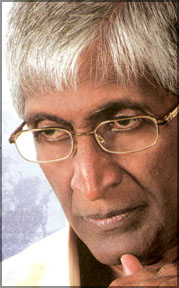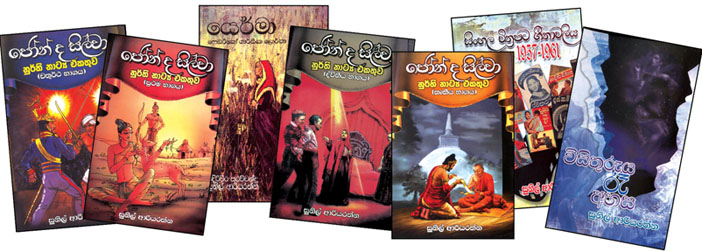Sunil Ariyaratne’s multi-faceted world
Professor Sunanda Mahendra
My good friend Professor Sunil Ariyaratne needs no introduction to
the Sinhala readers and media spectators of this country. His books and
films have won quite a number of awards at home and abroad. His
specialty is Tamil literature about which he had done extensive studies
compiling various types of books in Sinhala inclusive of folktales from
various parts of India such as Malayalam and Telegu that appear as most
notable languages.
 These Indian language folktales have made an indelible mark among the
Sinhala readers where the studies in cross cultural currents are mainly
concerned. Some scholars say that these mini books finely illustrated by
Sybil Wettasinghe have paved the way for the understanding of the
mannerisms and behaviour patterns of common folk in both India and Sri
Lanka. These Indian language folktales have made an indelible mark among the
Sinhala readers where the studies in cross cultural currents are mainly
concerned. Some scholars say that these mini books finely illustrated by
Sybil Wettasinghe have paved the way for the understanding of the
mannerisms and behaviour patterns of common folk in both India and Sri
Lanka.
From time to time Professor Ariyaratne performs some sort of miracles
by bringing out a series of books in the form of scholarly editions. The
latest to have come is the completion of the complete works of the late
theatre genius John de Silva with annotated references.
For the student of drama and theatre, these works, I am sure, will be
quite useful and they have appeared several times in print.
Then comes his volumes of lyric compositions and the latest to come
is titled as Visithuruya Re Ahasa, where he is seen compiling almost all
his lyrics written for films, teleplays, social events such as the
Tsunami devastation, light songs for radio, cassettes and CDs.
I have no doubts that he has written over thousand lyrics over five
decades commencing from his schooling days and now most of them have
been sung by the most popular songsters of the calibre of Amaradeva,
Nanda Malini, Victor Ratnayaka etc.
Professor Sunil also delves in translations. The award winning
translation of Garcia Lorca’s celebrated play Yerma which he translated
with the late professor Ediriweera Sarachchandra has appeared as the
second edition.
This factor is clearly indicative that that the translations of this
type are needed by the book lovers and are saleable commodities as well
as necessary source material for the student and the teacher. It is
indicated that he had written and edited fifty books by a single book
publisher and the event was notified over media as an important event in
the life of a university don. It certainly is, as he is not only
confined to the print medium, but also the other media channels. This
especially is noted as the visual medium of television and large screen.
He has directed and sometimes written and directed more than fifty
Sinhala films and this should also be counted as a score in the life of
a university don.
His latest Sinhala film titled as Uppalavanna became instantly famous
and attractive for several reasons. The theme of the film centred round
a reinterpreted Buddhist story similar to a Theri gatha story as
modernised or rediscovered by the script of Dr. Tissa Abeysekara. It was
one of the record breaking box office successes and viewed by various
types of members of the society.
His lectures centre round the teaching of Sinhala classics where his
forte being the poetry. Have I missed anything else about him? Yes many
more. He is one of our clearer minded presenters of musical programmes
over radio and television channels.
Once I was watching one of his chatty television programmes, Gi Re,
where he illustrated, commented and furthermore interviewed a number of
singers and made them remember their own songs sung in the past.
The programmes which were beamed to the night audience was full of
stimulating materials with an eye on the historic past as well as
present packed with aspects of popular culture.
Strictly speaking, he does not belong to any schools of thought, but
he desires and wants insist that the new trendy pseudo creative thinking
in the field of communication should be studied without rushing to any
obstructive speculations.

From time to time he travels abroad especially to India where he
finds more materials for his forthcoming books. In this direction, I
observe that his research work Demala Bauddhaya (The Tamil Buddhist) was
packed with lots of uncovered socio literary material. But I have a
feeling that the work passed unnoticed from the eyes of those who
matter.
He encourages his students to take up innovate steps in creativity.
He is also the pioneer of most of the literary events such as Nala
mudu Suvanda celebrated annually by the staff and students of the
University of Sri Jayawardenepura
[email protected]
|

